Interview With Dr. Carrie (Beth) Robertson
In my recent conversation with Dr. Carrie (Beth) Robertson, a Neurologist with a subspeciality in Nerve Pathology and Headache Medicine, Mayo Clinic – Minnesota, recently published a paper with her team on various causes of secondary visual snow (VS). Secondary VS patients had symptoms of static-like vision related to an underlying cause. She states that since that publication, she has seen many additional secondary cases and may end up publishing a second collection. Dr. Robertson describes her main goal as to alert other physicians for things to check for and test when seeing patients with new onset static in their vision. In addition, for patients willing to try medication to alleviate their symptoms, Dr. Robertson is currently tracking which medicines are the most effective and the possible side effects.
Message From Dr. Robertson
A message she wanted to share with VSS patients and the medical community is that “not everyone with visual snow is alike, there are some who have VS their whole life, some who do not even realize it, some who abruptly start to experience VS after an event, and the experience of symptoms differs.” Dr. Robertson encourages patients who develop a new onset of VSS to seek an evaluation, as eye diseases and other illnesses may cause symptoms similar to VSS. Therefore, it is essential to get proper testing performed. If there is a physician from the VSI directory near you, this might be a great place to start to ensure the physician is familiar with the condition.
Dr. Robertson states she feels grateful that her passion for VSS has led her to become the “Visual Snow Expert” within Neurology at Mayo Clinic, allowing her to see numerous visual snow consults. She explains that referrals regarding VSS have increased over the years and suspects this is due to the extensive work the medical community is doing to educate physicians and the general public with the help of organizations such as the VSI and social media sites. Dr. Robertson is confident that as we gain a deeper understanding of this condition, we will be able to identify additional management strategies with both medicine and non-medicine approaches.


